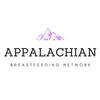ABN Initiatives
When we first started ABN, our goal was to increase access to care for lactation endeavors. However, we quickly realized this is a health issue in general. Therefore, we are working on several initiatives, that are constantly growing into new initiatives or subsets of initiatives.
Here's a list of what we are working on currently:
When it comes down to it, our mission is "to work towards transformation of breastfeeding culture in Appalachia by providing empowerment and education in order to increase access to care." Every initiative we work on and add always comes back to our mission and we ask ourselves, "how will this increase access to care in Appalachia?" We have a long way to go and we have so many ideas to continue this sometimes messy work. We know we need to work more on closing the racial and health equity gap in Appalachia.
When we first started ABN, our goal was to increase access to care for lactation endeavors. However, we quickly realized this is a health issue in general. Therefore, we are working on several initiatives, that are constantly growing into new initiatives or subsets of initiatives.
Here's a list of what we are working on currently:
- 24-Hour Breastfeeding Hotline (available to anyone) - a parent or interested person may call the line during operating hours to speak with a live breastfeeding specialist (CLC, CLS, or IBCLC required). All hotline staff is trained on providing telephone support and is a line for supporting and referring, therefore able to provide lactation support to all of Appalachia through telephone when otherwise may be unavailable - closing the gap in health inequity for breastfeeding support.
- Appalachian Latch Leader (ALL) Program - New in 2023! The Appalachian Latch Leader (ALL) Program is a "train the trainer" program based on increasing lactation education in communities of Appalachia. Participants will engage in three (3) educational sessions that give basic breastfeeding/chestfeeding information that will prepare the participant to train others in their community. The goal is to increase awareness and education to increase access to care in Appalachia.
- Empowering Parents Project - This is our social media campaign to empower parents to take hold of their own health care, including lactation support. We are present on Facebook, Instagram, and Twitter as "Empowering Parents Project"
- Speaking Engagements - In an effort to educate on Appalachian breastfeeding barriers to the rest of the nation, our board members are active in conference attendance outside of our own conference. In addition, we have started to become involved in submitting abstracts at national and international conferences.
When it comes down to it, our mission is "to work towards transformation of breastfeeding culture in Appalachia by providing empowerment and education in order to increase access to care." Every initiative we work on and add always comes back to our mission and we ask ourselves, "how will this increase access to care in Appalachia?" We have a long way to go and we have so many ideas to continue this sometimes messy work. We know we need to work more on closing the racial and health equity gap in Appalachia.
Proudly powered by Weebly
